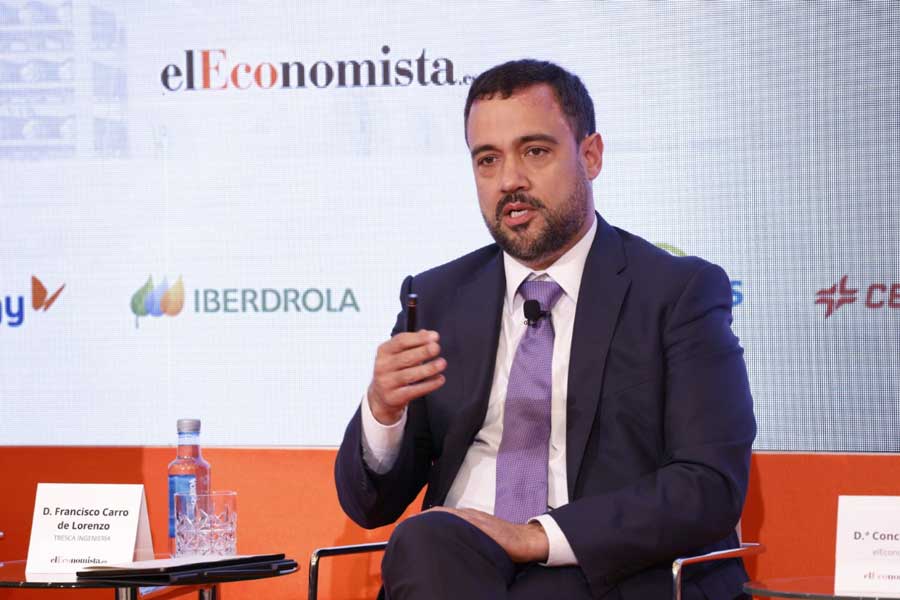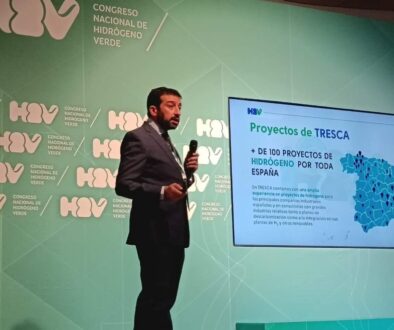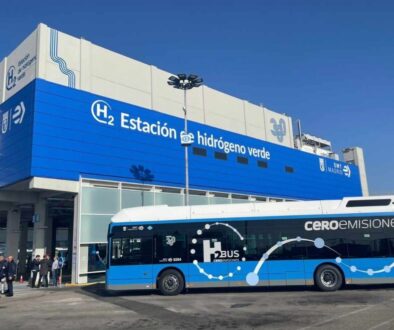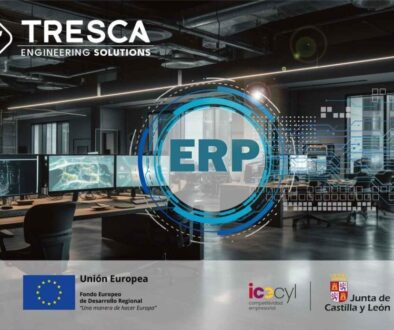TRESCA CONSIDERS THAT TAXATION SHOULD CHANGE FOR DECARBONISATION TO TAKE PLACE
Companies warn that projects stop when investment has to be launched
León, 29 May 2022.
Hydrogen taxation and legislation are key to building the trust that investors need in order to invest in projects that companies are executing. In this way, energy alternatives based on sustainable hydrogen can become a competitive advantage for decarbonisation.
This is the conclusion drawn by Tresca Ingeniería’s CEO, Francisco Carro de Lorenzo, and highlighted at the 2nd round table of the 1st Business Forum: The hydrogen development in Spain, organised by El Economista and entitled “The hydrogen competitiveness in Spain.” Carro de Lorenzo stressed that “nobody talks about tax regulation risks.” The CEO made a comparison with tax laws applied to other types of fuels such as fossil fuels: “There is a perfectly harmonised regulation that raises funds and brings them to the State,” he stressed.
The regulatory framework for collection will act as incentive for this new technology.
The expert said that with green hydrogen “the State doesn’t stop collecting revenues”, and therefore it must have a tax regulatory framework acting “as a catalyst” to promote this new technology “so that industry and economy move towards it.” He also stressed that “when a taxation system linked to hydrogen is set out, this will regulate itself.”
For his part, the Green H12 Business Unit Director of Ingeteam, Harkaitz Ibaiondo, said that green hydrogen “is very competitive” when assessed in terms of its environmental impact. In addition, he claimed that taxation debate is “interesting” and that this regulatory framework “must take into account the cleanliness and environmental impact” to make hydrogen really competitive in the energy market.
Ibaiondo clearly explained that other energy solutions such as conventional hydrogen or fossil fuels “should bear greater tax burden due to their environmental impact.” He emphasized, in this regard, “the need to implement more emission taxation, which is actually reflected in the cost of emissions to society and the environmental impact, in order to have a green hydrogen market.”
Administrative deadlines cause bottlenecks in project development
Javier Gutiérrez, Director of Hydrogen Development at Ansasol, highlighted another obstacle faced by companies that intend to execute competitive projects: “We face the continuing problem of deadlines.” The expert emphasized that at his company “we focus on large projects of 40 MW” and have to deal with bureaucracy from local entities, regional authorities and then at national level. “It’s a regulatory framework that private companies can’t exit,” he said. And all this is combined with “the lack of infrastructure for component manufacturing, which leads to 24-month deadlines.“
Pierre Cohen, Business Development Manager – H2 energy at Air Liquide, declared at present, there is “an open dialogue between institutions and companies that we have never had before”, and reiterated that there is still room for further improvement: “I think sometimes the influence we may have is underestimated.” By this, Cohen meant that “industries have the know-how” to develop projects leading to the creation, use and transport of sustainable hydrogen, and thereby contributing to the decarbonisation of the planet. All of this with a view to becoming an emission-free continent by 2050, as set out in the EU target.
With regard to the EU, Pierre Cohen stated that Spain and the other member countries were “lucky”, as “we can see what our neighbours are doing and get the best out of it.” For this expert, the solution follows two ways: “First upstream, all focused on supporting products, and downstream supporting the end consumer.”
The whole dialogue led to the issue of providing legal and fiscal certainty to attract investment. Francisco Carro explained that, once the project has been authorised, and the company gets to have all the administrative procedures accepted, “then the investment funds are notified” to seek that financing. “But we explain to these funds we need EUR 200 million to continue and what they ask of us is legal certainty..”
For this reason the sector has this demand, becausewe see project clocks stopping. It’s all set up, with licenses and permits in order, and projects are, as it is often said in the field, ready to bill right now,”that is, ready to build. And in order to change their status, uncertainties must be removed “so that funds release that investment,” he explained.
Aenor’s Energy Manager, Juan Manuel García Sánchez, came up with a solution as “there are regulatory measures that companies can rely on to overcome this impasse”,both in taxation and legal and administrative regulation. By way of example, García said the current electricity-intensive industry legislation “could be transferred to the use of hydrogen.” He recalled that other sectors “have gone through very similar situations“.
Furthermore, in order to make progress in this investment, green hydrogen projects need a certification process that provides such “confidence”, just like any industrial process, and the role of Aenor is vital in this case. As its Energy Manager, García Sánchez, explained, their organization is listening to “all stakeholders” in order to draw up a document that can be used voluntarily by organizations to agree on and set out requirements valid for all.
Hence, the certification role is that organizations “have these tools bringing together the principles of necessity for R&D&I, the energy origin… in order to give a margin of peace to the whole hydrogen cycle and of confidence to the participants,” he explained.
Finally, the Chief Operating Officer of pHYnix Iberia, Ricardo Izquierdo, stressed that electricity-intensive companies “are willing to buy guarantees of origin” and that regulation should be able to provide them, so “a methodology is needed to monetize them.” He also declared that all plants with a solar profile have it covered and can do so with other profiles such as wind, but“reaching 24 hours of production is going to be more difficult. It should be more released in the short term“.
ENERGY REVOLUTION
But nobody doubts that sustainable hydrogen is a fact. Francisco Carro de Lorenzo said that this new energy alternative is causing “an energy and social revolution.” The expert warned that “revolutions are not orderly” and emphasized that, apart from that, “they are never free.”
Carro de Lorenzo assured that “we are having a green inflation“in which we will have to control these costs and learn to manage them. But when we move from what he described as “a transitional regime” to a more permanent one, we will have to know how to manage it. This is why, he said, “necessary decisions must be taken so that it has little impact in the corporate balance sheet.” But for Pierre Cohen, there is one important factor in this revolution: its actors. Air Liquide’s Head of Hydrogen Development said “we must be the ones who mitigate the disruption of this revolution in order to give confidence to investors” because if stability is not ensured, “money is very fearful.” The solution to ease this fear with the capital, he said, “is regulation.”
SPAIN, AN OUTSTANDING STUDENT
The six speakers agreed that Spain is a very important niche in renewable hydrogen and a reference power in Europe. The President of the European Commission, Ursula von der Leyen, pointed out that Spain accounted for 20% of the world’s clean hydrogen projects. In his speech, Pierre Cohen stressed that Spain is “incredibly lucky” as concerning renewable energies, it is “one of the best European students with the enormous advantage of having large companies with vast experience.“
Likewise, Francisco Carro said that the country has “two marvellous things in terms of projects” because companies are putting “a huge amount of money” on the table. At the same time, “we encourage investors’ appetite for our resources.” He reiterates that they attracted funds “creating hydrogen investment platforms associated with our country.”
The best way to demonstrate these statements is with facts. Those present at this table briefly examined the projects they are carrying out. For example, in the case of Ingeteam, Harkaitz Ibaiondo stressed that they are proposing “electrical conversion solutions through electrolysers and “we have already concluded the first contracts. ” Specifically, they have a 2 GW project in place in Saudi Arabia, a 100 MW project in Egypt and another 250 GW project in Australia. He assured that one of the main problems is connecting customers to the network.
For its part, Tresca Ingeniería has been involved in hydrogen projects “since the early 1990s,” said Francisco Carro. Among their lines of action, they work “in the entire hydrogen value chain”, especially in electrolytics. They are working on around 50 projects in Spain and address lines such as hydrogen pipeline transport. They are also incorporating hydrogen for the decarbonisation of industry and, in addition, they provide technical advice on projects to large investment funds.
On the part of pHYnix Iberia, Ricardo Izquierdo highlighted the Vitale Project, with a plant construction in Alcázar de San Juan (Ciudad Real), where 4.13 t of renewable hydrogen per day will be produced to supply zero-emission fuel to freight and passenger transport in the region of Madrid.”Our goal is to start producing hydrogen by the end of 2023,” said Izquierdo.
In the case of Ansasol, Javier Gutiérrez said that they are embarking on around twenty projects under development, “mostly with 4 MW of electrolyser power” and have primarily focused on mobility projects. Furthermore, they concluded a R&D&i agreement with the University of Malaga for hydrogen transport in a state other than gaseous.
Finally, at Air Liquide, Pierre Cohen highlighted a 20 MW electrolyser project and another 200 MW project in Normandy. Also, he brought attention to a mobility project in the south of France, “where we intend to connect to the European corridors” with the first 1,700-bar hydrogen refuelling station dedicated to heavy vehicles. “These are very big projects,” he concluded.
About Tresca:
Tresca Ingeniería is a company from León that offers top services in the industrial engineering and consultancy field. With a consolidated track record of 20 years, Tresca Ingeniería has worked in up to 30 countries around the world in key industrial sectors and has become a benchmark company in industrial applications and green hydrogen mobility and, consequently, a standard bearer for this resource to achieve climate neutrality and the economy and industry decarbonisation. Read more:
More information:
Carlos Asensio







